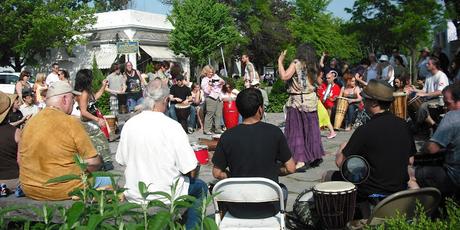 (I took this picture of a "Hippie" Drum Circle in Woodstock, New York just a few years ago.)
(I took this picture of a "Hippie" Drum Circle in Woodstock, New York just a few years ago.)The society in the United States in the 1950's and 1960's was a very restrictive one. It excluded many non-whites, kept women as second-class citizens, demonized the LGBT community, and looked down on anyone who didn't want to live their lives as proscribed by that society.
But in the mid-60's, the Baby Boomers began to come of age. And they didn't want to live in a society so restrictive and demanding of conformity. They began to rebel. In 1967, thousands of them participated in a "Summer of Love" in San Francisco. They shucked off society's restrictions and made it clear they would no longer conform. It began a movement that quickly spread across the country (and even to other countries). It became so popular and so widespread that it spawned a "count-culture".
This counter-culture had different beliefs than those in the larger society (culture). They believed that everyone was equal (regardless of race, color, sex, sexual preference, etc.). They believed that love was more powerful than hate, that peace was better than war. And they believed that all people should have the freedom to live their lives as they wanted -- even if that was frowned upon by those in the dominant society. And throughout the late 60's, the 70's, and early 80's, that counter-culture was large and it was vibrant.
That counter-culture doesn't exist anymore. Which brings me to my question -- Whatever happened to the "hippies" that inhabited that counter-culture? Did they disappear into thin air? Did they "grow up" and abandon their hippie beliefs? No. Neither of those things happened. The hippies are still with us -- and most of them still embrace the ideals and beliefs they had in the counter-culture.
So, what happened? The larger American society (culture) changed. It expanded to include all races, genders, sexual preferences, and even the rebels who didn't like the government or the society. It included them all. It was no longer unacceptable to be different or to want to live your life in a different way or to have different ideas about what was good and what was not. The counter-culture was absorbed into the larger culture of the country.
Does that mean we now have a perfect society and culture? Not at all. There are still many battles to be won to make this society better for everyone -- but the society has expanded enough so that a separate counter-culture is no longer needed. The changes can now be made from within society.
The hippies are not only still with us, but a case could be made that they won -- won by forcing the larger society to change and become more inclusive and flexible.
NOTE -- In this post I have used the term "hippie" to designate the members of the counter-culture. That's because that's the term that most people accept for the "flower children" today. But they did not call themselves hippies. They called themselves "freaks" -- because they knew that was how many straight people viewed them, so they embraced the term and made it their own.

